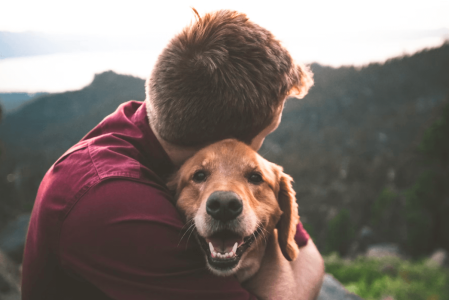Like man, like dog: How dementia affects our furry friends
- Replies 2
There is undeniable wisdom to the age-old saying that dogs are a man's best friend. But did you know that our precious pets may also share similar health conditions with us as they age?
Believe it or not, our canine companions are prone to developing dementia too. Now recent research has revealed that dogs with dementia have difficulty sleeping deeply, just like people with Alzheimer's disease.
Doggy dementia, or canine cognitive dysfunction (CCD), often goes unnoticed or is misdiagnosed as it shares many symptoms familiar to other ailments that affect senior dogs.
Although CCD primarily occurs in dogs over the age of eight, some cases have been reported in younger dogs as well. The condition is quite similar to Alzheimer's disease in humans, as it slowly impairs cognitive functions and causes behavioural changes in our pets over time.

Researchers from North Carolina State University (NCSU), partnering with their colleagues from Argentina and Hungary, conducted a groundbreaking study that provides more insight into the sleep patterns of our furry friends when they develop dementia.
The team, led by NCSU veterinary neurologist Alejandra Mondino, has been examining the effects of CCD on senior dogs and discovered that, much like their human counterparts, the dogs exhibited interrupted and less deep (shallow) sleep.
During the study, the researchers monitored the brain waves of 28 senior dogs as they took a two-hour nap. Shockingly, the dogs with dementia displayed stronger beta wave activity—a trait associated with wakefulness—leading the scientists to believe these dogs' brains weren’t completely at rest, despite appearances.
Moreover, the dogs with signs of dementia were found to have a significant reduction in slow-wave sleep (SWS). This is important because SWS is associated with the glymphatic system in the brain, which helps remove toxins and waste proteins from the cerebrospinal fluid.
In Alzheimer's patients, a decrease in SWS has been linked to poorer memory consolidation due to reduced clearing of toxins during deep sleep. A similar process could be occurring in our four-legged friends as well.
This study has opened up the possibility that dogs might, in fact, be useful models for further research into Alzheimer's disease. As such, understanding the link between sleep disturbances and cognitive decline in both humans and dogs may pave the way for better treatment options.
The study was published in Frontiers in Veterinary Science.

Now, you might be thinking, what can I do to help my ageing pooch? Firstly, always keep an eye out for unusual behaviour changes in your pet, as early detection of CCD can make a significant difference in managing the condition.
Consult with your veterinarian if you notice anything out of the ordinary, and they can recommend appropriate interventions and treatments.
In addition to veterinary care, remember to give your pet the love, attention and patience they deserve as they grow older. Keep their minds active with regular mental stimulation through play, training exercises and maintaining a stable routine.
Remember that changes in sleep patterns and cognition require understanding, and you'll need to adapt to make life easier and more comfortable for your ageing companion.

Lastly, be sure to share this newfound knowledge among friends, family, and fellow dog owners, as raising awareness about canine cognitive dysfunction and the impact it has on sleep quality might be beneficial for our furry companions in their golden years.
We hope you found this article helpful, folks! Have you noticed any changes in the behaviour or cognitive abilities of your dog? How have you addressed them, and what impact have you seen? Share them with us in the comments!
Believe it or not, our canine companions are prone to developing dementia too. Now recent research has revealed that dogs with dementia have difficulty sleeping deeply, just like people with Alzheimer's disease.
Doggy dementia, or canine cognitive dysfunction (CCD), often goes unnoticed or is misdiagnosed as it shares many symptoms familiar to other ailments that affect senior dogs.
Although CCD primarily occurs in dogs over the age of eight, some cases have been reported in younger dogs as well. The condition is quite similar to Alzheimer's disease in humans, as it slowly impairs cognitive functions and causes behavioural changes in our pets over time.

Research has found that old dogs suffering from dementia don't sleep deeply, much like humans who've been diagnosed with Alzheimer's Disease. Credit: Unsplash/Irina.
Researchers from North Carolina State University (NCSU), partnering with their colleagues from Argentina and Hungary, conducted a groundbreaking study that provides more insight into the sleep patterns of our furry friends when they develop dementia.
The team, led by NCSU veterinary neurologist Alejandra Mondino, has been examining the effects of CCD on senior dogs and discovered that, much like their human counterparts, the dogs exhibited interrupted and less deep (shallow) sleep.
During the study, the researchers monitored the brain waves of 28 senior dogs as they took a two-hour nap. Shockingly, the dogs with dementia displayed stronger beta wave activity—a trait associated with wakefulness—leading the scientists to believe these dogs' brains weren’t completely at rest, despite appearances.
Moreover, the dogs with signs of dementia were found to have a significant reduction in slow-wave sleep (SWS). This is important because SWS is associated with the glymphatic system in the brain, which helps remove toxins and waste proteins from the cerebrospinal fluid.
In Alzheimer's patients, a decrease in SWS has been linked to poorer memory consolidation due to reduced clearing of toxins during deep sleep. A similar process could be occurring in our four-legged friends as well.
This study has opened up the possibility that dogs might, in fact, be useful models for further research into Alzheimer's disease. As such, understanding the link between sleep disturbances and cognitive decline in both humans and dogs may pave the way for better treatment options.
The study was published in Frontiers in Veterinary Science.
Key Takeaways
- Dogs can also develop dementia, known as canine cognitive dysfunction. Recent research has found that old dogs with dementia experience less deep sleep, similar to people with Alzheimer's disease.
- Scientists at North Carolina State University and their colleagues from Argentina and Hungary discovered that dogs with marked cognitive issues showed stronger beta wave activity while napping and experienced a significant loss in slow-wave sleep.
- The findings suggest that dogs may be a good model for research on Alzheimer's disease, and further research is needed to understand if sleep disturbances trigger cognitive decline or if cognitive decline causes sleep disturbances.
Now, you might be thinking, what can I do to help my ageing pooch? Firstly, always keep an eye out for unusual behaviour changes in your pet, as early detection of CCD can make a significant difference in managing the condition.
Consult with your veterinarian if you notice anything out of the ordinary, and they can recommend appropriate interventions and treatments.
In addition to veterinary care, remember to give your pet the love, attention and patience they deserve as they grow older. Keep their minds active with regular mental stimulation through play, training exercises and maintaining a stable routine.
Remember that changes in sleep patterns and cognition require understanding, and you'll need to adapt to make life easier and more comfortable for your ageing companion.

Regular exercise and walking our dogs may help them reduce the risk of dementia. Credit: Unsplash/Eric Ward.
Lastly, be sure to share this newfound knowledge among friends, family, and fellow dog owners, as raising awareness about canine cognitive dysfunction and the impact it has on sleep quality might be beneficial for our furry companions in their golden years.
We hope you found this article helpful, folks! Have you noticed any changes in the behaviour or cognitive abilities of your dog? How have you addressed them, and what impact have you seen? Share them with us in the comments!







